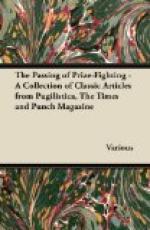Result: Amendment defeated by 329 to 64.
Thursday, February 12th.—This was the first Question-day of the new Session, and the House was flattered to see Mr. LLOYD GEORGE in his place, despite the counter-claims of the Peace Conference at St. James’s Palace. Evidently he means this year to “stick to the shop” more closely, in view, perhaps, of the possible return from Paisley of the old proprietor.
To a Labour Member’s complaint that several ex-Generals had been appointed as divisional Food officers, Mr. MCCURDY replied that no preference was given to military candidates. But why not? Where will you find more competent judges of alimentary questions than in the higher ranks of His Majesty’s Forces?
In attacking the provisions of the Peace Treaty with Germany as “impracticable,” Sir DONALD MACLEAN revealed himself as a diligent student of a recent notorious book. Most of his observations—excepting, perhaps, the statement that he had “no sentimental tenderness for the Germans”—were marked with the brand of KEYNES, and his assertion that the utmost Germany could pay was two thousand millions came bodily from that eminent statistician. To the same inspiration was possibly due the unhappy suggestion that our chief Ally was pursuing a policy of revenge.
For this he was promptly pulled up by Lord ROBERT CECIL, who warned him not to judge the policy of France by the utterances of certain French newspapers. Lord ROBERT had, however, his own quarrel with the Government, who, according to his account, had done nothing to set Central Europe on its legs again, except to send it a certain amount of food—not, one would would have thought, an altogether bad preliminary.
It was a pity that Mr. BALFOUR had not a stronger indictment to answer, for he was dialectically at his best. After complimenting the Opposition leader on his “charming tones and anodyne temper” he proceeded to take up his challenge—“if I may call it a challenge.” If Germany was in doubt as to the amount she might be called upon to pay, she had her remedy, for the Peace Treaty especially provided that she might offer a “lump sum.” The list of war-criminals was long, no doubt, but we had limited our own demands to those who were guilty of gratuitous brutality. As for the condition of Central Europe, that was not the fault of the Peace Treaty, it was the fault of the War, and this country had done all it reasonably could to remedy it.
The Opposition insisted on taking a division, and were beaten by 254 to 60. So far the “doomed Coalition” seems to be doing rather well.
* * * * *
A SINGLE HOUND.
When the opal lights in the West had died
And night was wrapping the
red ferns round,
As I came home by the woodland side
I heard the cry of a single
hound.
The huntsman had gathered his pack and
gone;
The last late hoof had echoed
away;
The horn was twanging a long way on
For the only hound that was
still astray.




